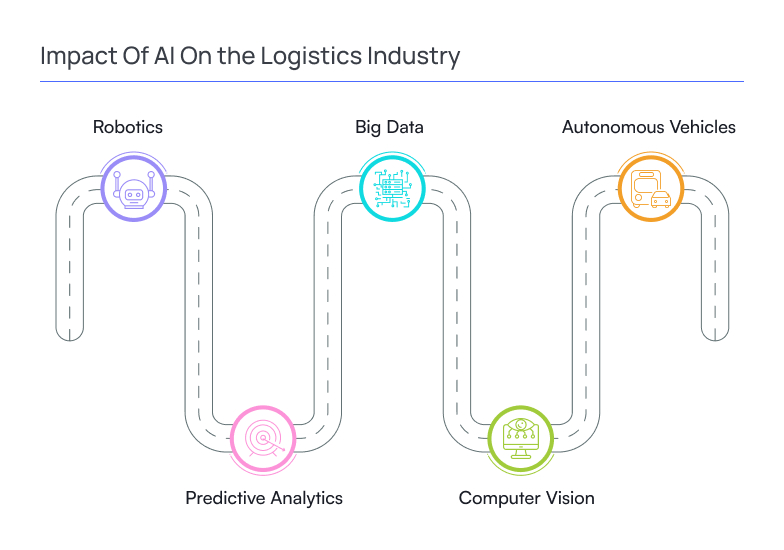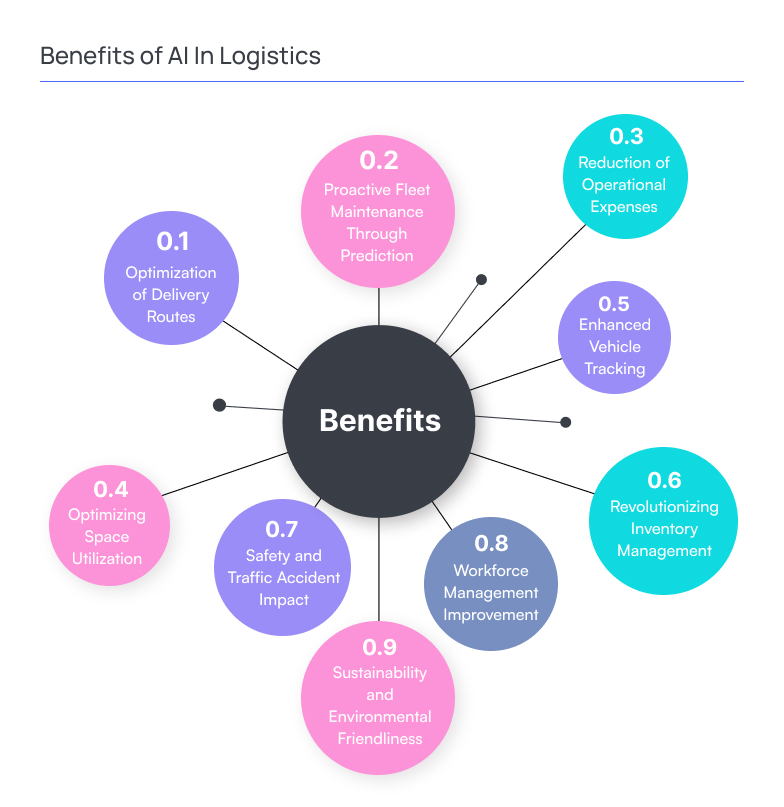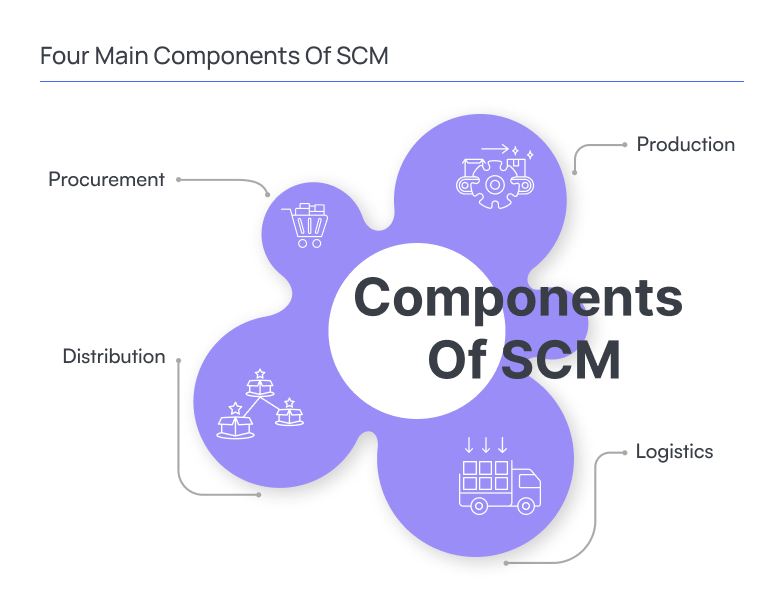Have you ever paid attention to the evolution of technology? As a rule, we see how technologies evolve but don’t conduct a comparative analysis to see how better one or the other technology has become. The logistics industry is one where the use of the latest tech innovations has changed drastically throughout the last decade. And AI played a significant role in it.
Artificial intelligence in logistics contributes to greater autonomy and reduced human labor and involvement. According to MarketSplash, the successful integration of AI has led to a 15% reduction in logistics costs, a 35% decrease in inventory levels, and a 65% improvement in service levels for businesses.
In this article, we will cover all the benefits and impacts of AI on logistics and supply chains in particular. It will help you understand that AI is the future, and if you want your logistics business to thrive, you must start integrating AI solutions into your business.
Is it complicated? Not at all if a company like Binerals creates AI-based software for your company. But first things first.
Impact Of AI On the Logistics Industry
If you want to build your own AI software for the logistics industry, you should have proof of how AI and logistics turn into long-lived symbiosis.

Robotics
Logistics robots refer to autonomous systems or machines designed to automate the movement of products, enhance safety, and increase productivity within warehouse operations.
The integration of emerging technologies in various warehouse processes, including goods receipt, storage, stock management, order processing, and shipping, has elevated the significance of these robots. Operating with complete autonomy, these solutions perform tasks such as transferring products between locations, assembling orders, and storing items on racks.
Predictive Analytics
Leveraging historical data for demand prediction can revolutionize the logistics industry by effectively managing inventory and improving operations. AI is pivotal in conducting sophisticated data analysis across various levels and intervals.
Applying machine learning and other advanced techniques to process extensive datasets ensures error rates below 1%, leading to more efficient utilization of human labor. The optimization of supply chains through AI and analytics not only mitigates risks but also facilitates more accurate forecasting, leading to improved profitability.
Implementing predictive analysis allows for strategic planning of shipments and optimizing routes to simplify the entire process. Informed decisions can be made regarding different modes of transportation, further enhancing results through thoughtful enhancement.
Big Data
Data is valuable across all industries, and logistics is no exception. However, integrating AI in logistics makes efficient and meaningful handling of vast amounts of data possible.
Comprehensive analytics enable staying ahead of the curve and preparing your business for anticipated risks, such as bad weather conditions. The processing of such extensive data is achieved through Big Data analytics.
Computer Vision
AI-based computer vision is a machine learning algorithm that empowers artificial intelligence to effectively categorize and segregate packages based on various criteria such as damages, faults, and categories.
This technique involves the integration of cameras with computers, mirroring the coordination between the human eye and brain during processing. Additionally, it can classify inventories by dimensions, weight, and other specified parameters. In warehouse settings, this technology facilitates the swift loading and unloading of packages with the assistance of robots. The use of AI automation in these tasks not only saves time but also reduces reliance on costly human labor.
Autonomous Vehicles
Autonomous vehicles equipped with AI systems have the potential to revolutionize the trucking industry by significantly minimizing delivery times. These systems excel in identifying optimal and expedited routes to destinations, thereby reducing transit durations.
Moreover, the risk of package damage is mitigated as the AI system rapidly analyzes data and intelligently processes actions, enhancing overall operational efficiency and profitability. While safety features for autonomous vehicles are still in the design and testing phases, the integration of AI holds promise for transforming the delivery landscape.
Benefits of AI In Logistics
The impact of AI on logistics is enormous. However, it would be better to single out the main advantages of artificial intelligence in the logistics sector.

Optimization of Delivery Routes
Efficient route optimization ensures accurate and timely deliveries, reducing transportation and shipping costs. The core of route management lies in analyzing extensive data to find the most optimal routes.
AI in transportation and logistics focuses on enhancing delivery route efficiency, uncovering new, time-saving routes, and providing a competitive edge. It helps cut operational costs and minimizes fuel expenses and paid hours, contributing to significant overall savings.
Proactive Fleet Maintenance Through Prediction
Predictive fleet maintenance, a prime example of AI in logistics transportation, enables proactive identification and resolution of underlying issues. This approach anticipates future patterns by leveraging historical data and prioritizes vehicles with urgent repair needs.
Data-driven decisions are facilitated by collecting information on recurring issues, particularly those reReduction of Operational Expenseslated to engineering problems, enhancing overall fleet management.
Integrating AI in the transportation industry reduces operational costs, particularly in addressing issues like traffic congestion, contributing to $74.5 billion in operating costs in 2016. AI helps companies predict challenges, enhance delivery operations, and utilize fewer vehicles, significantly saving salaries, maintenance, marketing, and production costs.
Optimizing Space Utilization
AI technology is crucial in calculating and optimizing space utilization in transportation and shipping. By collecting and analyzing vast amounts of data, businesses can forecast optimal capacity utilization on routes, ultimately reducing the number of vehicles involved and minimizing costs.
Revolutionizing Inventory Management
The use of AI for warehouse logistics is incredible. AI-driven automation revolutionizes inventory and warehouse management by enhancing efficiency and reducing errors. Through analyzing consumer behavior, AI keeps warehouse stocks to a minimum, reducing maintenance and renting costs. The technology also provides short-term and long-term predictions, ensuring optimal storage based on supply-demand dynamics and identifying seasonal trends.
Enhanced Vehicle Tracking
AI in transportation integrates with vehicle tracking through IoT technology. Logistics companies can receive real-time location, speed, and direction information by placing IoT sensors on each vehicle. It ensures secure and efficient delivery, with accessible cloud-stored data from any device at anytime.
Safety and Traffic Accident Impact
Implementing AI in transportation enhances safety, especially in developing countries facing infrastructure challenges. AI can mitigate human error, a significant contributor to accidents, by introducing autonomous vehicles. It can potentially save lives, addressing safety concerns posed by poor roads and outdated vehicle safety standards.
Workforce Management Improvement
Adopting AI in transportation is crucial in improving workforce management, particularly in recruitment and human resources processes. AI-driven tools facilitate onboarding new employees, monitoring and evaluating their performance, and assigning tasks according to their strengths.
Sustainability and Environmental Friendliness
AI applications in transportation contribute to sustainability by developing innovative methods to power vehicles without harming the environment. It leads to reduced carbon emissions and lower fuel usage, aligning with global efforts to address climate change and promote eco-friendly practices.
AI In Logistics and Supply Chain Management: How It Contributes
First, knowing what supply chain management (SCM) means is necessary. It includes four fundamental components crucial for its effective operation:

Procurement
The procurement component involves the sourcing and acquiring of goods or services needed for the supply chain. It covers supplier selection, negotiation, and purchasing activities to ensure a reliable and cost-effective supply of materials or services.
Production
The production component focuses on the conversion of raw materials into finished products. This phase involves manufacturing processes, quality control, and coordination of activities to create the final product.
Distribution
Distribution means the movement of products from manufacturing facilities to end customers. This component involves the coordination of transportation, storage, and order fulfillment to ensure timely and accurate delivery.
Logistics
Logistics is the comprehensive process of planning, organizing, and controlling the movement of goods from their origin to their final destination. It includes transportation management, inventory control, and strategic planning to enhance the flow of goods throughout the supply chain. By the way, logistics software development is the first step to the digital transformation of your business, even if your first software doesn’t apply AI algorithms.
A well-functioning SCM system relies on efficiently managing each of these components. The synergy between procurement, production, distribution, and logistics is crucial for the seamless delivery of goods and services within specified timelines. Successful SCM ensures that all these elements work harmoniously to meet customer demands and maintain overall supply chain efficiency.
AI In Procurement
The use of AI in supply chain and logistics is revolutionizing the procurement process for organizations. Utilizing robust data analysis tools like machine learning algorithms, AI-driven technologies provide valuable insights that allow companies to make more informed and intelligent procurement decisions.
Moreover, the automation facilitated by AI has streamlined various procurement processes, including vendor search, purchase order creation, and inventory management. It not only enhances overall efficiency but also reduces the occurrence of human errors.
Predictive Analytics for Demand Planning
AI enables predictive analytics to enhance demand planning, ensuring organizations are well-prepared for future needs and can effectively manage inventory. Given the unpredictability of customer trends, AI-powered analytics systems provide ample supply chain data, offering sufficient warning before surges in demand.
AI-Powered Chatbots in Procurement
AI-driven chatbots streamline common inquiries from vendors and customers, allowing employees to focus on more complex tasks. It results in cost reduction and improved customer satisfaction, as timely messaging and well-planned funnels save time for clients, enabling seamless query resolution. The impact of chatbots on business is significant since they help you retain your clients and improve service quality.
Automated Supplier Selection with Machine Learning
Machine learning algorithms automate supplier selection, assisting companies in identifying the most reliable providers. Businesses can achieve significant cost reductions by eliminating the potential for human error and enhancing efficiency.
In summary, the strategic integration of AI technologies in procurement processes provides valuable insights through data analysis. It automates various tasks, increasing efficiency, reducing costs, and improving overall customer satisfaction.
Transform your supply chain management with AI-powered solutions.
Contact UsAI In Production
Logistics and AI become beneficial for each other. AI’s role in supply chains extends beyond procurement, with production processes reaping substantial benefits from integration. Machine learning and the Internet of Things (IoT) are leveraged to enhance predictive maintenance, quality control, risk assessment, and other facets of production.
AI-driven systems identify potential problems before they escalate, facilitating proactive measures to address issues before causing significant disruptions or incurring costly repairs. Predictive technology analyzes data from past disruptions, reducing repair costs and preventing disruptions, thus offering dual avenues for cost reduction.
Machine learning algorithms enhance quality control by analyzing extensive datasets from product tests. Identifying patterns in defects allows companies to find weaknesses in the production process, ensuring products meet desired standards and improving overall product quality.
AI-based solutions enable real-time risk assessment, ensuring uninterrupted production without unexpected delays or bottlenecks. It enhances production efficiency and reduces costs associated with downtime and problem rectification.
Cost-Saving through Automation
AI and robotic automation automate processes, increasing production speed and accuracy. It saves expenses by reducing human labor costs and enhancing product quality. While the initial automation costs may be high, they are outweighed by long-term labor cost savings. Robotic automation operates faster and without downtime compared to human labor.
Efficient Quality Inspection
AI helps in product quality inspection, reducing costs, and maximizing efficiency. Machine learning algorithms make it possible to analyze vast amounts of data, swiftly identifying defect patterns and improving overall product quality.
Predictive Analytics for Maintenance
Predictive analytics schedules maintenance or repairs on machines before mechanical failures occur. Organizations save on downtime by predicting malfunctions and scheduling maintenance accordingly, reducing unexpected delays and hiccups in production.
AI In Distribution and Logistics
AI significantly impacts logistics and distribution processes, introducing innovations such as automated delivery systems and real-time tracking. These advancements enable companies to streamline operations and enhance customer experiences.
AI in logistics and transportation forecasts the most efficient shipment routes through data analysis, reducing transportation costs and increasing profits by minimizing time investments. It ensures timely deliveries, improving overall efficiency.
Automated delivery systems ensure quick and smooth deliveries by eliminating the need for human intervention. It not only increases efficiency but also contributes to enhanced customer satisfaction.
AI-based real-time tracking enables companies to monitor shipments, guaranteeing on-time delivery closely. This feature provides transparency and accountability throughout the supply chain.
Cost Reduction through Route Optimization
AI optimizes routes, reducing costs associated with downtime and problem rectification. It improves customer satisfaction by enabling quicker delivery times and lowering logistics costs.
Enhanced Efficiency and Competitive Edge
By leveraging AI in their operations, businesses operate more efficiently, gaining a competitive edge in their respective markets. The transformative impact of AI in logistics and distribution systems leads to improved overall performance and customer satisfaction.
Challenges Of Artificial Intelligence Adoption In Logistics
Even though there are not many disadvantages in logistics and artificial intelligence symbiosis, you should be aware of them to realize all the pitfalls that may get in the way.
Resource Challenges in AI Implementation
The relatively new nature of AI technology means many businesses need more technical expertise and resources to implement and manage AI systems effectively. As early as 2011, a McKinsey study highlighted a need for more people with excellent analytical skills. By 2018, the US faced challenges with a need for more trained personnel capable of utilizing Big Data analysis for effective decision-making. Education becomes a significant barrier as hiring and training skilled employees in AI technology further escalates implementation and maintenance costs.
However, there is a perfect way out – collaborating with Binerals company, which provides full-cycle AI and machine learning development services.
Privacy and Security Considerations with AI
Handling sensitive customer data using AI systems raises concerns about privacy and security. Historical cybersecurity breaches have diminished businesses’ confidence in technology solutions.
Companies must carefully evaluate the appropriateness of embedding AI, considering alternative forms of automation for processes dealing with sensitive information. One breach can lead to disastrous consequences.
Nevertheless, it doesn’t mean that you should forget about AI adoption. A reliable software development company that creates AI solutions for you always considers security issues and does everything necessary to protect your software with up-to-date security techniques.
Summing Up
The use of AI in the logistics industry has multiple capabilities. Logistics requires the implementation of so many tasks that it would take time and effort for people to do everything independently. That is why integrating AI technologies becomes inevitable if you want to stand out and gain the lead.
From predictive maintenance in production processes to route optimization in distribution, AI has proven instrumental in mitigating risks, reducing costs, and enhancing overall operational efficiency. Moreover, the application of AI in logistics extends beyond operational benefits, contributing to sustainability efforts, improving safety, and improving workforce management.
Thus, you aim to find a reputable software development company to help you turn your idea into working solutions where AI will boost and revolutionize your logistics business.
Start your app journey today using our guide, and contact us for assistance
Contact BineralsFAQ
What role does AI play in environmental sustainability?
AI aids in sustainable practices by optimizing resource usage in agriculture, managing energy grids, and predicting environmental trends. It supports conservation efforts and helps mitigate the impact of climate change.How does AI enhance cybersecurity measures?
AI in cybersecurity employs machine learning to detect and respond to threats in real time. It analyzes network behavior, identifies anomalies, and fortifies defenses against evolving cyber threats.How does AI contribute to personalized learning in education?
AI in education tailors learning experiences to individual students. It analyzes learning patterns to create customized coursework, provides instant feedback, and offers additional resources to address specific learning needs.